Backlinks are considered a crucial aspect of SEO strategy and If I may exaggerate a bit, one could practically earn a bachelor’s degree solely by studying data about them.
I don’t want to scare you right from the start, so let me reassure you right away: your blog has the potential to rank without relying on backlinks.
Before we proceed, I want to assure you that you shouldn’t overly stress about backlinks at this stage. Building backlinks is indeed a skill that requires mastery.
In fact, during my time as an SEO consultant for a SaaS company, they had a dedicated team solely focused on building backlinks. It’s not something a beginner blogger should prioritize.
Instead, your primary focus should be on creating high-quality content.
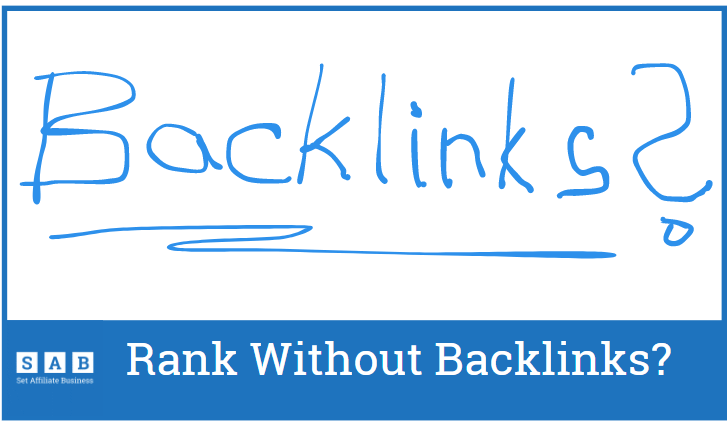
Now, let’s get into the technique I’ll be discussing in this article, which allows you to rank without relying heavily on backlinks.
This technique revolves around targeting longtail keywords. By focusing on these specific, more niche keywords, you can potentially rank for them without needing an extensive backlink strategy.
Additionally, I have a special bonus for bloggers who already have some content on their websites.
I’ll be sharing one of the easiest techniques to request backlinks.
Consider this technique as your first lesson in building backlinks, as it can be a valuable skill to acquire.
So, in this article, I want to provide a simple and straightforward guide specifically for beginner bloggers, just like I once was.
Now that we’ve covered the introduction, let’s dive right into the main content.
Jump to:
- What are Backlinks?
- The best way to improve rankings without backlinks
- 8 Other Ways How to Improve Rankings without Backlinks
- The easiest and best way to get backlinks (Bonus)
- Conclusion
- FAQs
Can I rank my website without backlinks?
Yes, it is possible to rank a website with a low domain authority without building backlinks.
The secret is to target low-competition keywords.
“Low competition” refers to weaker sites ranking on Google’s first page, including:
- Forums,
- Quora,
- Reddit,
- Social media platforms,
- and websites with a Domain Authority below 20.
If you do the right keyword research for your website, Google will naturally put it on the first page when people search for those terms.
If you’re itching to know more, keep reading the article for additional insights.
What are Backlinks?
Think of a backlink as a virtual recommendation. It’s when a website says, “Hey, check out this other website because it’s helpful, interesting, or just cool”.
Now for you as an owner of a website, backlinks are links pointing from an external website to your website.
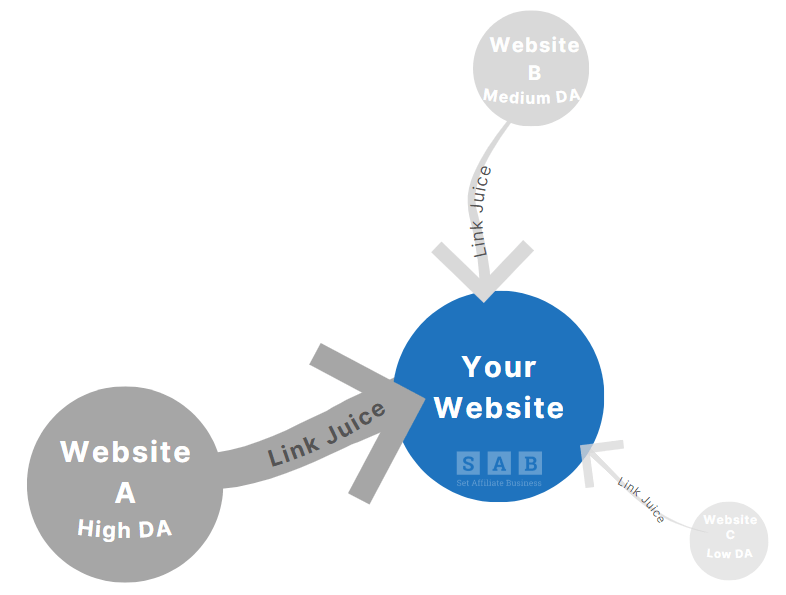
They are also called inbound links or incoming links because we are looking at them as links from external sources coming to your website.
In other words, they serve as approval from a trusted source.
A backlink’s value can vary, ranging from high to low or anything in between.
This means that a website with 10 backlinks from low domain authority sources is not as highly regarded as a website backed by 2 highly authoritative domains. In simpler terms, it’s about the quality of backlinks rather than the quantity.
The greater the number of high-quality links a website has, the more authority it gains, often referred to as domain authority (DA).
A Backlink analogy to illustrate
Let’s use an example;
Imagine a hockey player named Mike Mudesi. If 50 people from a high school say Mike is a great hockey player, it may hold some meaning.
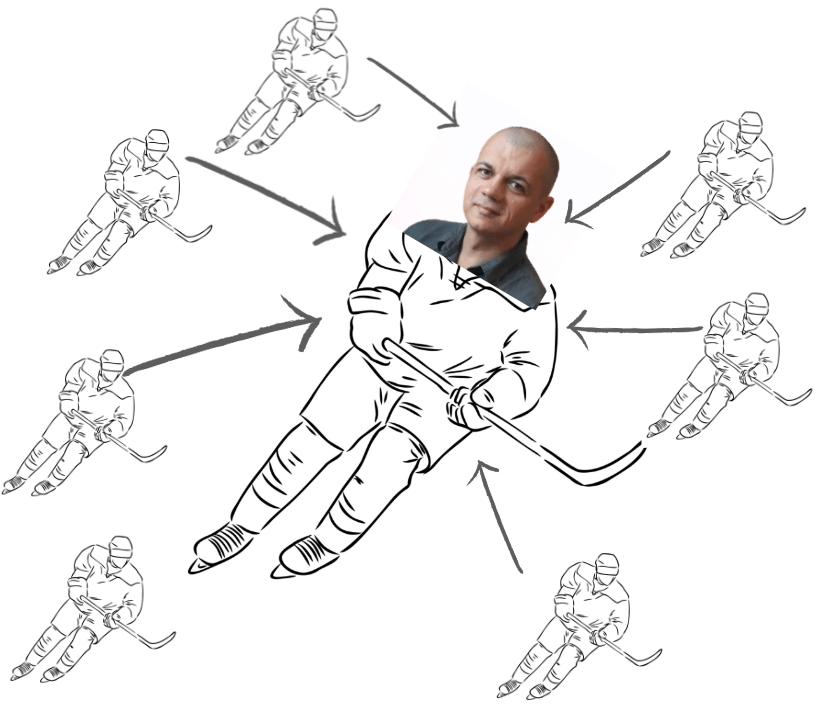
Now, let’s take it a step further.
What if the legendary Wayne Gretzky says Mike is a great hockey player? That certainly carries more weight.
Now, picture Wayne Gretzky, Jaromir Jagr, and Marian Hossa, all highly respected players, saying that Mike is a great hockey player.

You might be wondering how you’ve never heard of this star player before.
Still, these authoritative figures pointing to Mike as a great player show the importance of receiving endorsements from high authority sources.
Types of Backlinks
I believe the concept of high-value backlinks and low-value backlinks is clear.
Nothing is too easy and that applies to backlinks as well, so let me put another dimension to the backlinks.
There are two types of backlinks;
- Do-Follow and
- No-Follow
In simple terms, the Do-follow links pass the link juice to your website, the no-follow does not.
Let’s break it down a bit.
Do-Follow Backlinks
Do-follow backlinks are special links that help your website get noticed by search engines like Google.
When other important websites link to your content, it’s like they’re sharing some of their influence and giving your article a boost in the rankings.
In other words, when a website with a Domain Authority (DA) of 85+ links to your content, it effectively shares a portion of its influential “link juice,” potentially elevating the ranking of your article.
Note: When writing a text and you want to add a link (anchor text) the Do-Follow link is added automatically.
You would have to switch it to “no-follow” manually – see the paragraph below).
No-Follow Backlinks
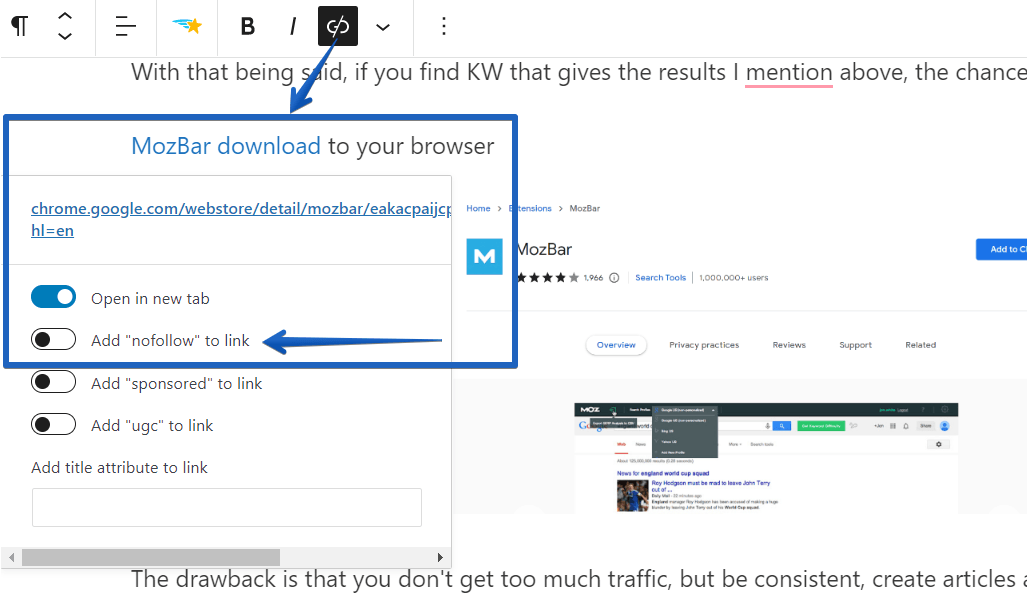
When a link is marked as No-Follow, it’s like telling search engines, “Hey, I’m connecting to this website’s article, but I -don’t want to transfer any of my valuable ‘link juice’ to it.”
No-Follow links are commonly seen in blog comments or these are also linked from:
- Social media platforms
- Forums
- Q&A websites, etc.
What is the difference between Do-Follow and No-Follow backlinks?
Do-Follow backlinks pass on page authority to the linked website,
while No-Follow backlinks do not.
Why are Backlinks Important?
Backlinks are important because they play a crucial role in determining the visibility and ranking of a website in search engine results.
They act as endorsements from other websites, indicating to search engines that your website is trustworthy, relevant, and valuable.
Webmasters seek backlinks to improve their website’s ranking for competitive search terms, as they contribute to increasing the domain authority (DA) and credibility of the website in the eyes of search engines.
What is Domain Authority?
Domain authority (DA) is a metric (a number) that shows the strength of a domain name (or a website) in SERP.
It is calculated by various factors, to name a few:
- number and quality of links pointing to the website
- quality of content
- relevance
- the user experience of the website
Domain authority ranges from 1 to 100 where 100.
Obviously, 100 is the highest score. The higher score is the higher the domain authority a website has.
In other words, the more trustworthiness a website has from a SERP point of view.
Backlinks still play a crucial role in ranking, but it is not the only factor.
Below you find more information about the other factors. So your website can rank even with no backlinks.
The best way to improve rankings without backlinks
Start creating content that is based on low-competition keywords, i.e. long-tail keywords.
When you target “longtail keywords” properly, you won’t have to bother with backlinks. These keywords have enough “power” to rank on their own, no extra effort is required.
What is a Long-tail Keyword?
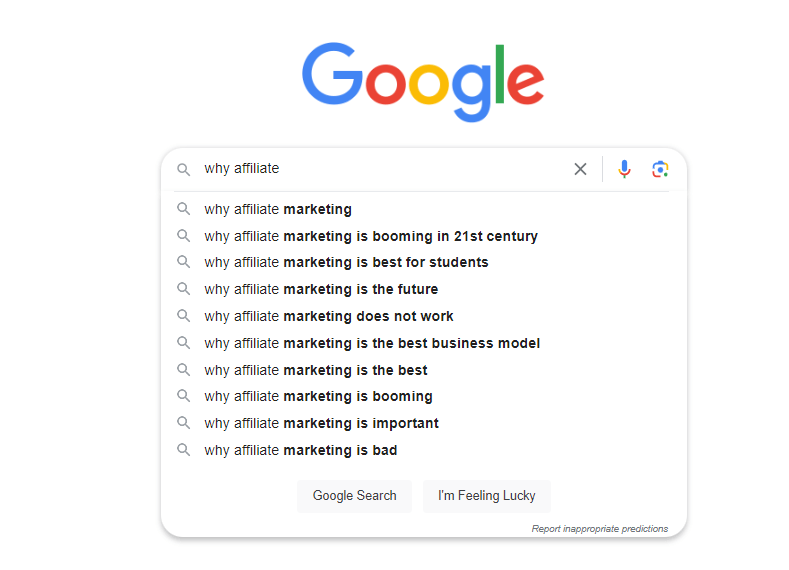
Let’s talk about longtail keywords, but let me clarify something upfront: everyone has a different understanding of what they are.
What I used to think, was that a Long-tail keyword was a phrase with 4+ words… Well with such an approach I couldn’t rank well using these “keywords”.
A longtail keyword is a specific keyword phrase that users enter in search engines when looking for particular information or products.
It is more specific and often has a lower search volume. The lower search volume doesn’t bother us for the time being.
The thing is that this specificity leads to search engine results that display websites with less competition, including those with lower Domain Authority (DA).
Therefore, even if your website has a lower DA, targeting longtail keywords gives you the opportunity to rank on the first page of Google. (Providing highly relevant and valuable content that aligns with the specific needs and intentions of users).
By leveraging longtail keywords effectively, you can even attract targeted traffic and potentially outrank competitors with higher DA.
How to find long tail keywords
This process is not difficult, but in some instances might require some time. Don’t let that discourage you from searching for the long tail keywords.
Tip:
You can leverage Google suggestions or even the “People also ask” section. Google these terms to see if you get the desired results (low DA sites, social media, etc.).
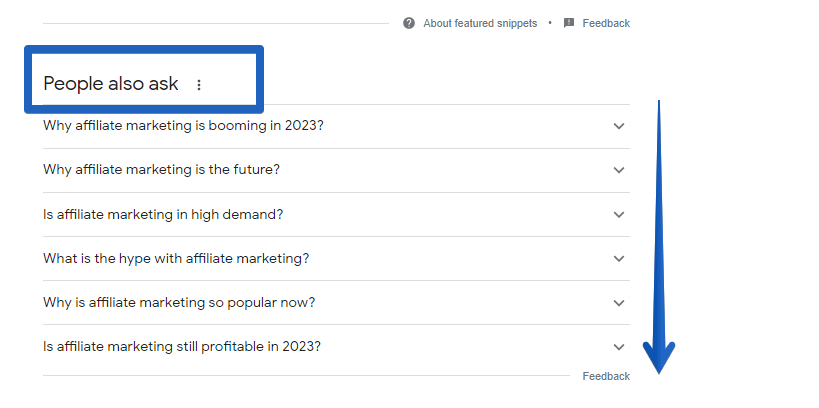
It is normal if you don’t find any terms within hours. In other instances, you might find 3 or 4 within minutes.
Based on the information we covered, here’s how to find long-tail keywords:
Focus on “weak sites” such as:
- Forums,
- Q&A sites,
- Quora,
- Social Media sites,
- and websites with a domain authority (DA) of less than 20
It’s enough if the SERP shows only 2 user-generated sites (UGC), like Facebook and Quora.
The rest of the sites should have a DA of about 20 or higher, at least a few of them.
Here comes the technical part – how to check the DA of a website in the SERP:
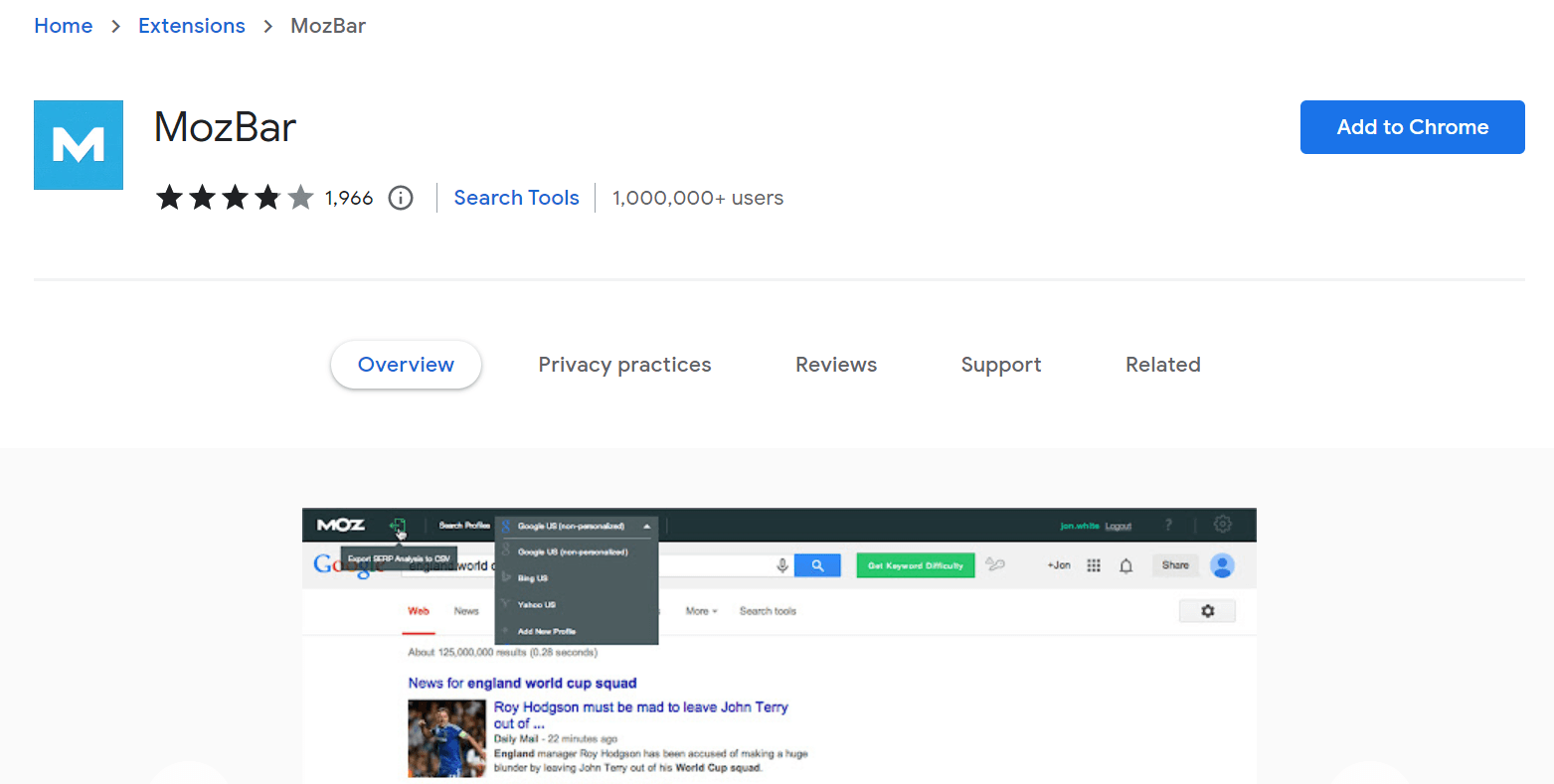
Download the MozBar download to your browser
It’s free, and you can instantly see the DA of each website.
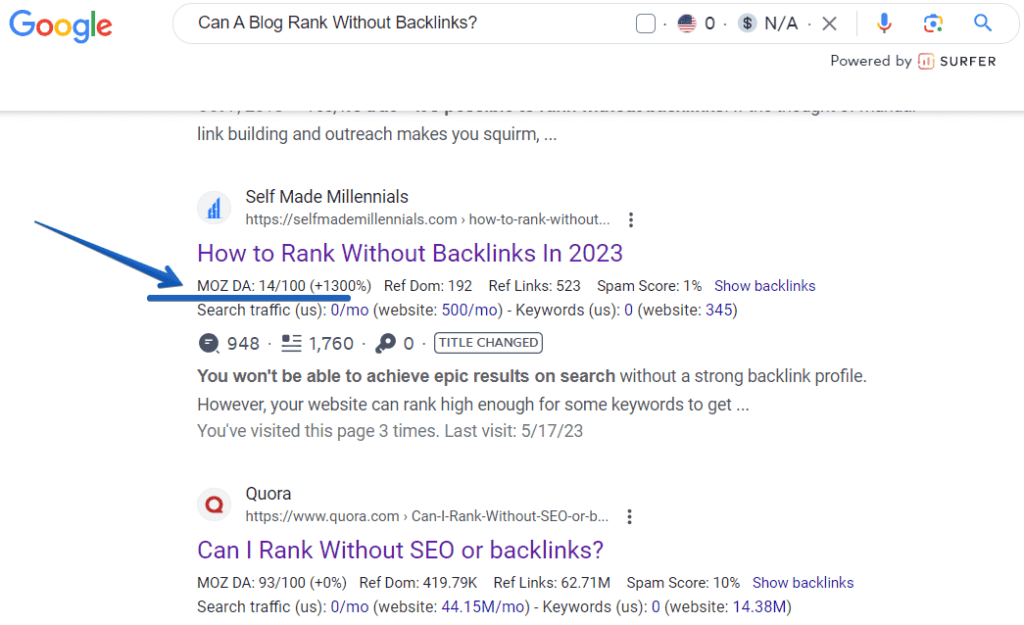
To sum it up;
If your articles are not showing up in search results, don’t worry about backlinks just yet.
Start by improving your keyword research.
If you’re not ranking, it means you haven’t chosen the right longtail keywords, which should be easier to rank for.
8 Other Ways How to Improve Rankings without Backlinks
We have covered probably the most effective way how to rank well without worrying about backlinks.
With that being said, keep in mind the following ways as well. These techniques will strengthen your sites in terms of rankings.
Understand search intent
Let’s analyze the SERP for the keyword “Clickbank alternative.”
While the initial intention may be to find a single alternative, it is evident from the SERP that the article should include a list of the top 8 most popular ClickBank alternatives.
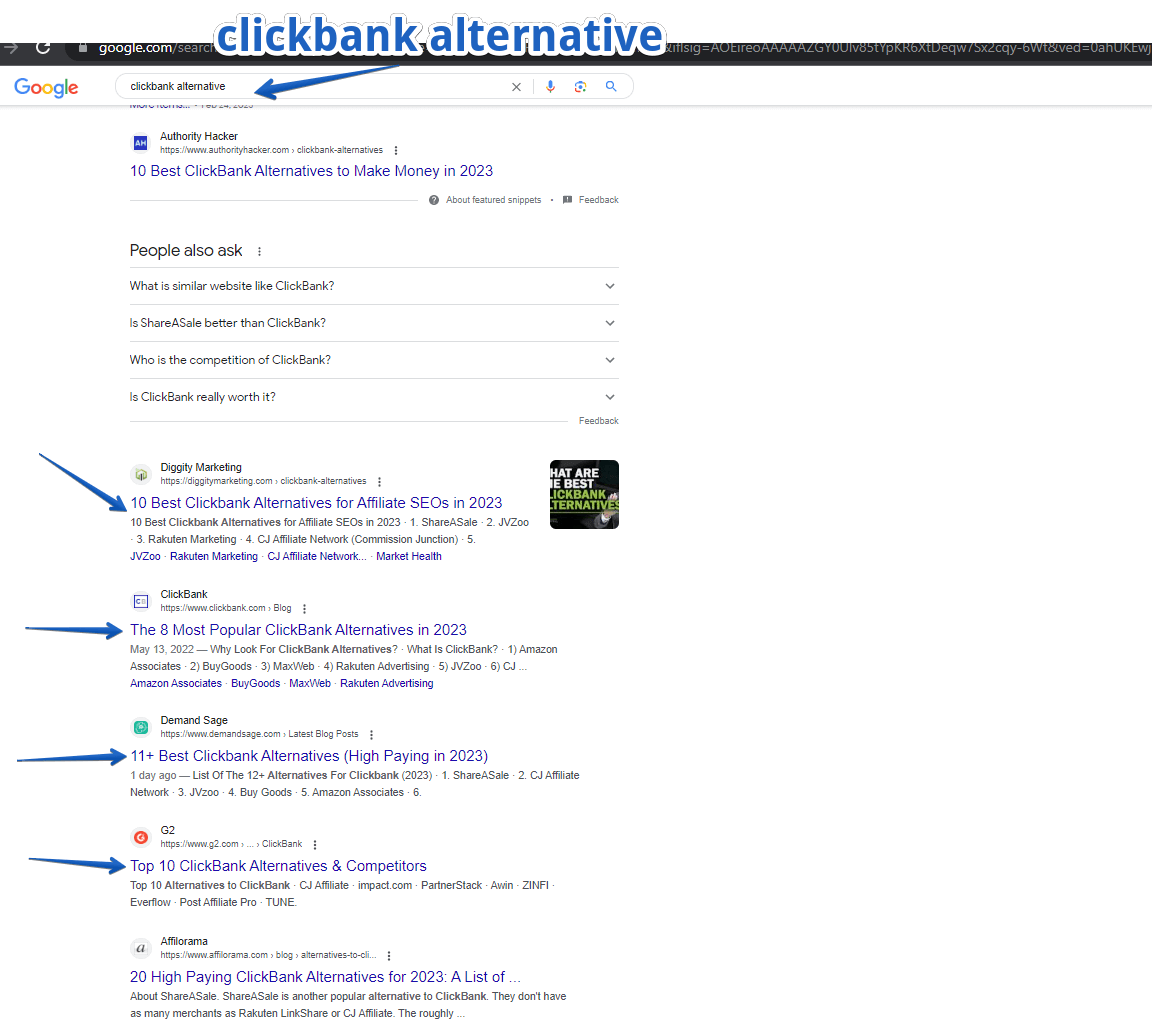
It’s important to note that this is a basic example, but the key takeaway is to always assess the search intent based on what the SERP displays.
Sometimes, guide-style articles dominate, while other times it’s list-based content.
Occasionally, it may be a combination of both. In such cases, it’s crucial to cover both the guide and the list in your article to make it stand out.
Tip: Stay attentive to search intent. Every six months, review the SERP and make any necessary adjustments to your content.
Content quality
Create a detailed piece of content that fully addresses the search query, covering all the important aspects.
And then add something unique. Draw from your own experience or the research you have conducted.
In other words, strive to offer additional value or insights that set your content apart and make it stand out from the rest.
User Experience
And here we come to a crucial point: your experience matters.
Think about it this way: if you had a bicycle and needed maintenance, would you trust someone with no prior experience in handling bicycles? It wouldn’t make sense.
Google acts similarly, using content to assess expertise and decide which sites to rank. Even if you lack personal experience, you can still visit the top-ranking pages on Google’s first page and strive to create even better content.
In many cases, demonstrating expertise can be as simple as conducting research and using that knowledge to provide valuable content.
Website Structure
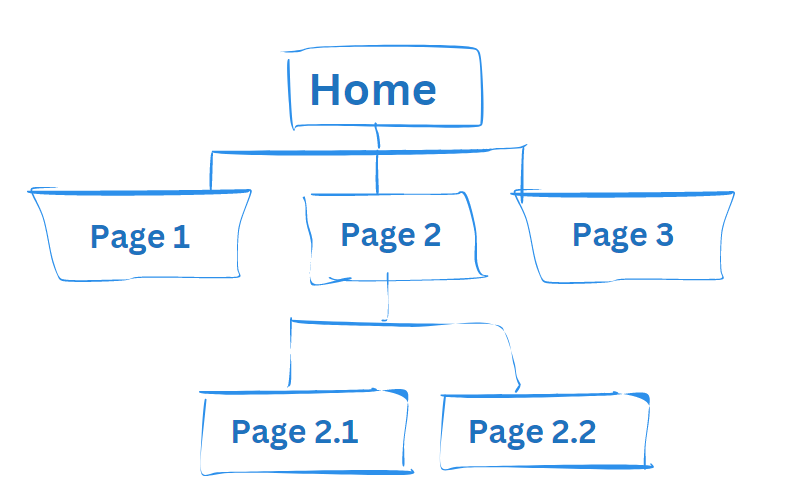
Ensure your website has a clear and organized structure.
It benefits both users and search engines. Just like in a physical store, you want visitors to easily navigate and have a positive experience.
This applies to individual pages too, where using H2 and H3 headings improves readability.
Tip;
Try using the Ahrefs SEO Toolbar to analyze how competitors structure their pages and gain insights for your own improvement.
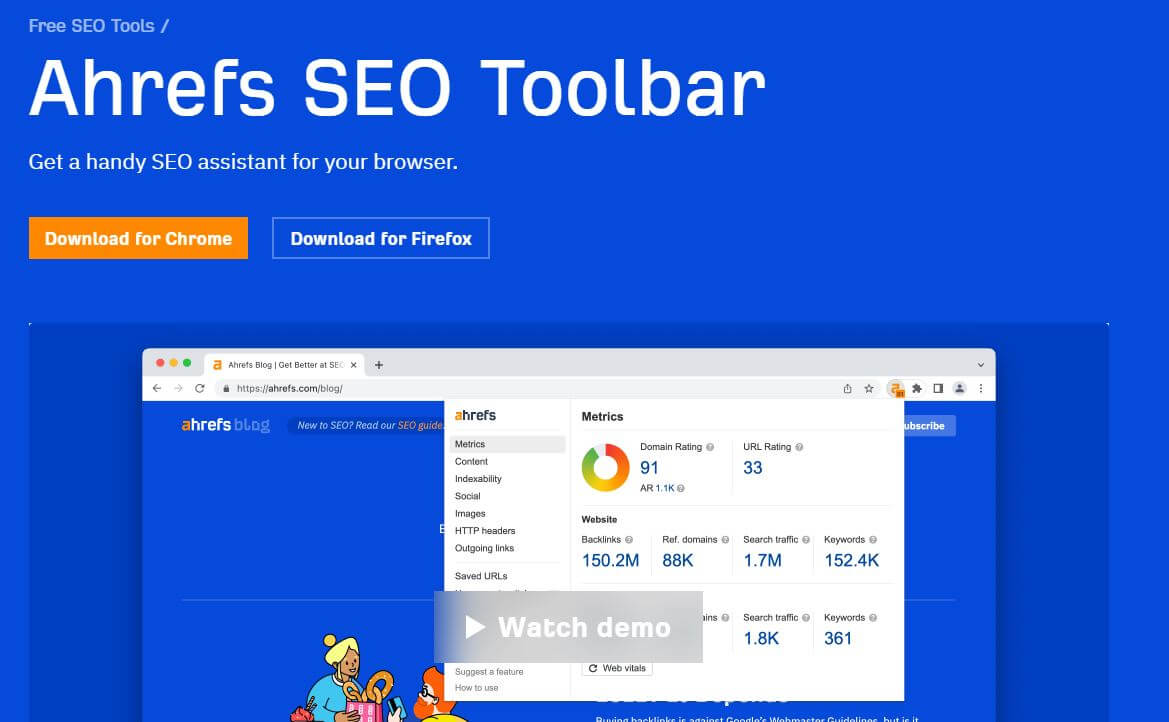
Social Media
It’s always a great idea to promote your content on social media and other platforms.
If you don’t have many followers yet, focus on offering something valuable first.
Show others that you genuinely want to help and provide useful information.
Once your followers become curious and interested, you can then share the link with them.
Remember, building trust and providing value is key!
Internal Linking
Internal linking is often underestimated by bloggers, but it plays a vital role in website ranking.
I’ve been part of a project where we implemented internal links across a site with thousands of pages.
That requires time and effort.
For smaller blogs like ours, it can be easier, but there are still key principles to follow.
The golden rule is to ensure that internal linking makes sense.
Treat them like road signs guiding users to relevant destinations. Misleading links can confuse both users and search engines, so prioritize relevance and helpfulness to enhance the overall user experience.
Work on your Click-Through-Rate (CTR)
CTR, or click-through rate, also plays a role in performance.
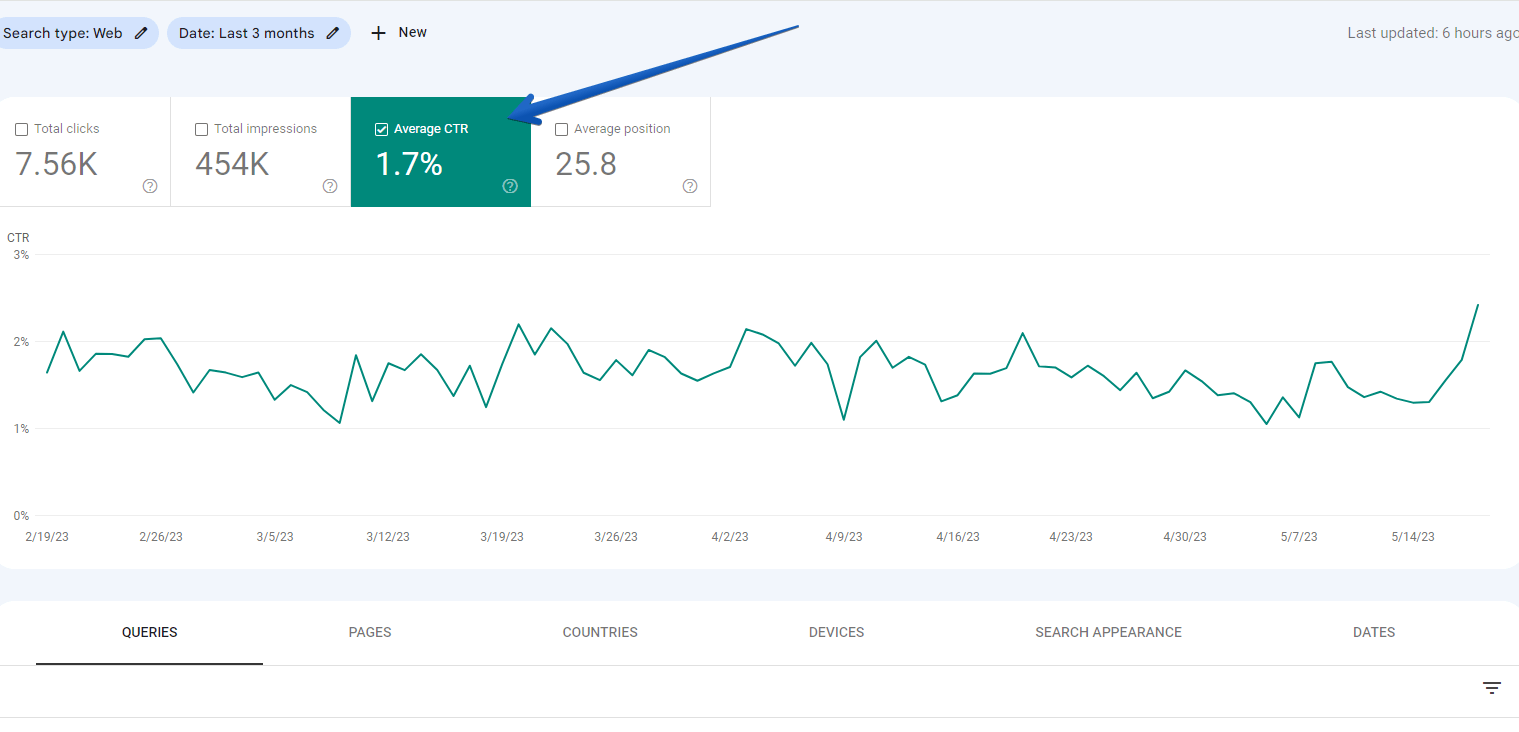
It is influenced by your Meta Title, appearing in search results. A low CTR can negatively impact rankings.
Stand out with an interesting and unique Meta Title without resorting to clickbait.
I conducted a test and found that optimizing the Meta Title improved both CTR and position.
Research other websites’ Meta Titles for inspiration and use a SERP preview tool for comparison.
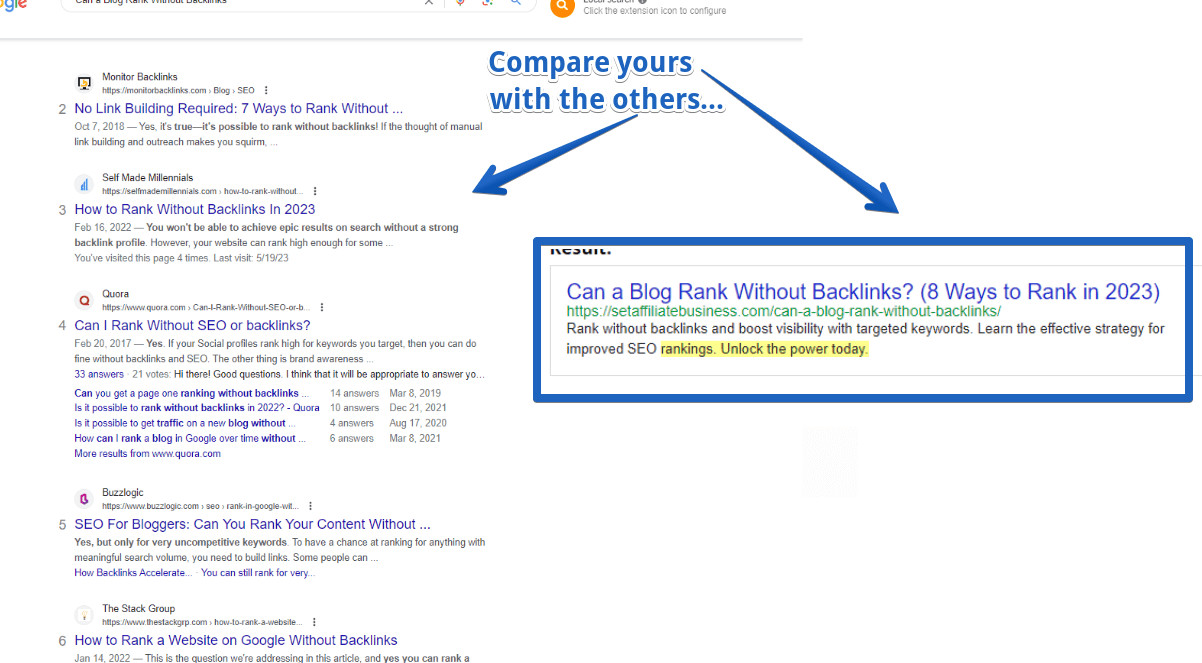
Also, remember to pay attention to Meta Descriptions. While they may not always show up exactly as you wrote them in search results, they can still appear, so it’s important to optimize them for better click-through rates (CTR).
Make adjustments as needed for an effective SEO Title.
Real relationships
Building relationships with other bloggers and influencers in your niche is crucial.
While there are many internet marketers who only focus on selling, it’s important to invest a few minutes in establishing connections with fellow marketers and becoming virtual friends.
Share ideas, discuss challenges, and you may find one or two individuals who can mutually support each other.
Attending a conference related to your niche is also a great idea. For example, in my case, an affiliate conference would be relevant.
However, I haven’t attended any yet, so I can’t provide much insight on that topic. (Not yet 😉 ).
The easiest and best way to get backlinks (Bonus)
I couldn’t resist sharing with you one of the easiest ways to obtain backlinks from other websites, especially suitable for beginners.
It involves identifying broken backlinks on websites in your niche and offering a simple solution to the webmaster.
You make sure you have relevant content related to the anchor text of the broken link, and then propose that the webmaster links to your page instead.
By fixing their broken link, you receive a boost in authority (depending on their Domain Authority), creating a win-win situation.
Best of all, you don’t need to pay for any tools to perform this strategy.
How to get the backlink?
Check the Ahrefs tool for free and have a look at your competitor’s website where they have broken external links
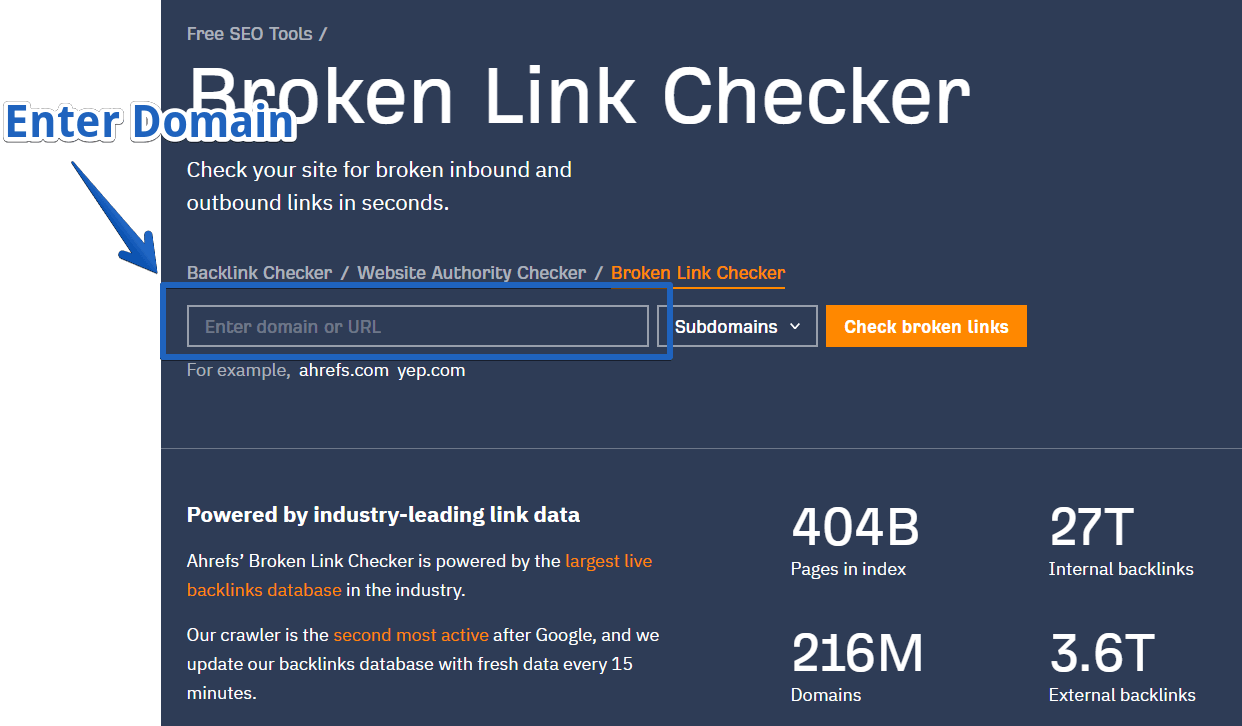
Make sure to have content that is related to the missing content.
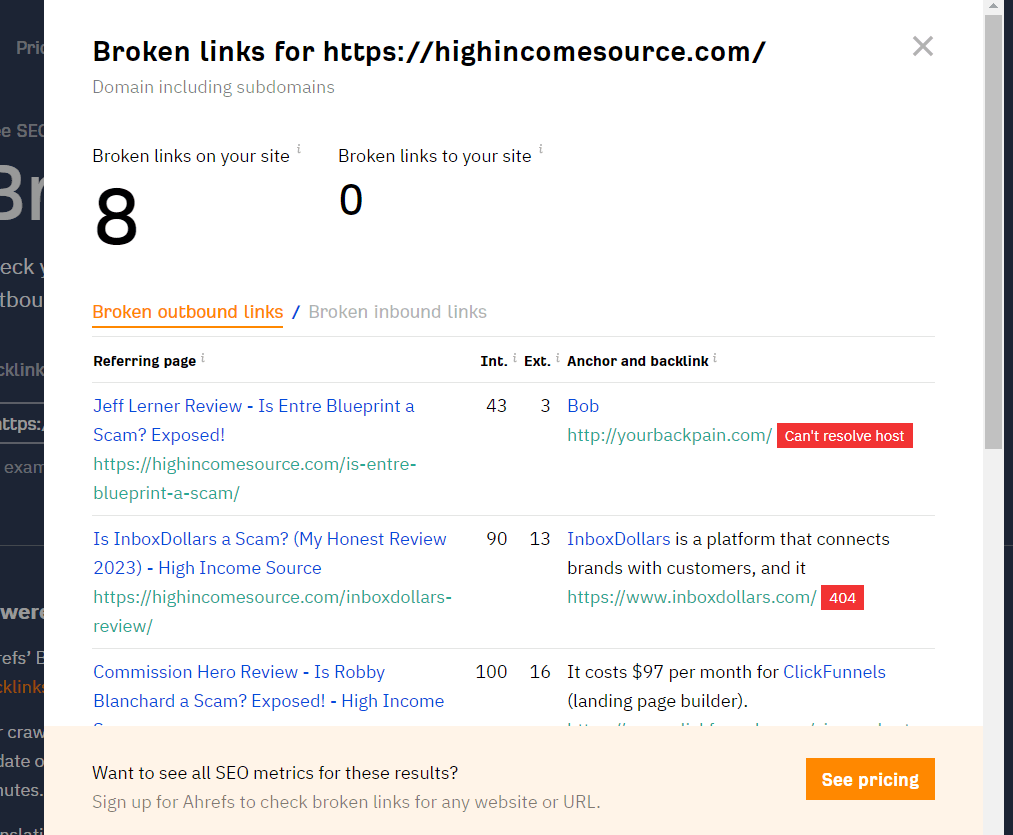
Reach out to the owner of the website and offer to mention that there is a broken link. Instead of searching for a new one you have one they can point to.
How to reach out to the website owner?
Here is a possible way how your email might be structured.
Please don’t copy/paste rather use it as inspiration. I am sure there are a lot of examples out there you can use as a model and modify to your own style.
Hey Steve,
It’s Mike!
You know, I’ve been a dedicated follower of your site for some time now, and I just have to say how much I appreciate the incredible content you consistently share. It’s always top-notch, and it keeps me coming back for more.
So, here’s the funny thing.
Lately, I’ve been really curious about [topic]. And guess whose site immediately came to mind? Yours, of course! I knew you’d have some fantastic insights and information on the subject.
And wouldn’t you know it, my expectations were exceeded once again. Your recent article on [specific topic A] versus [specific topic B] was mind-blowing. I loved how you broke it down and made it so easy to understand.
But hey, I’ll cut to the chase.
During my exploration of your site, I happened to come across a broken link. It was on [anchor text], and it was related to [Topic C]. It seems like the page doesn’t exist anymore (probably got removed or something).
Now, you know me, always eager to lend a helping hand. So, I thought I’d reach out and offer a solution.
It just so happens that I’ve written an article on [Topic C] myself. You can find it over at setaffiliatebusiness.com/[Topic C].
If you think my article covers all the important points you wanted to address, I’d be thrilled if you considered linking to it instead.
This way, not only would you get rid of that pesky broken link, but your readers would also have access to relevant and helpful information.
Well, that’s about it for now.
Keep up the fantastic work you’re doing, and know that I’m always cheering you on. I can’t wait to hear back from you!
Take care and warmest regards,
Mike
You see when you show genuine interest in Steve’s content and mention it in the email, it goes beyond just seeking a backlink.
By suggesting a replacement for a broken link, you’re doing Steve a favor and enhancing the reader’s experience. It’s a win-win situation.
Steve can easily make the change and voila! You’ve secured yourself a pretty good authority backlink.
Remember, building relationships and being helpful can open doors to valuable backlink opportunities. Keep up the great work!
Conclusion
We’ve covered the ins and outs of backlinks and their significance.
While they do hold value, the exciting part is that you can still achieve great rankings without solely relying on building backlinks.
We’ve explored some clever strategies, like targeting specific long-tail keywords, which can give you an edge.
Oh, and don’t forget, we’ve also shared some nifty techniques on how to kindly ask for backlinks.
If you’re itching to know more or have any lingering questions, don’t hesitate to drop them in the comments section below.
Remember, with the right approach, you can absolutely rank without backlinks and conquer the online world with confidence!
Thanks for reading,
Mike.
FAQs

What are Backlinks?
Backlinks are links from external websites that point to your website, serving as a “vote of confidence” and indicating relevance and authority.
Are backlinks important for ranking?
Yes, backlinks are an important ranking factor as they indicate the credibility and authority of a website to search engines. However, with proper keyword research and targeting of long-tail or low-competition keywords, it is possible to rank on the first page even without backlinks.
Can a blog rank without backlinks?
Yes, a blog can potentially rank without backlinks, especially if it targets longtail keywords with low competition.
Can bad backlinks hurt SEO?
Yes, bad backlinks can harm SEO. Toxic backlinks from low-quality or spammy websites can negatively impact search engine rankings. High numbers of toxic backlinks may result in penalties or decreased visibility.
Can I get traffic without backlinks?
Yes, it is possible to generate organic traffic to your website without relying solely on backlinks. According to the statistics, more than 65% of pages appear to lack any backlinks at all. (source Ahrefs).
Also, when starting a new website, obtaining backlinks can be challenging.
Instead, it’s easier to achieve traffic by focusing on high-quality content and targeting low-competition keywords. By implementing this strategy, your website can attract visitors and generate traffic.

About the Author
Mike is an affiliate marketing analyst, content creator, and the founder of SetAffiliateBusiness.com.
Consistently producing in-depth and insightful articles. ??
Recent Posts

Prompt Engineering, Prompt Engineering Fundamentals
Meta-Prompting: Teaching AI to Build Better Prompts for You
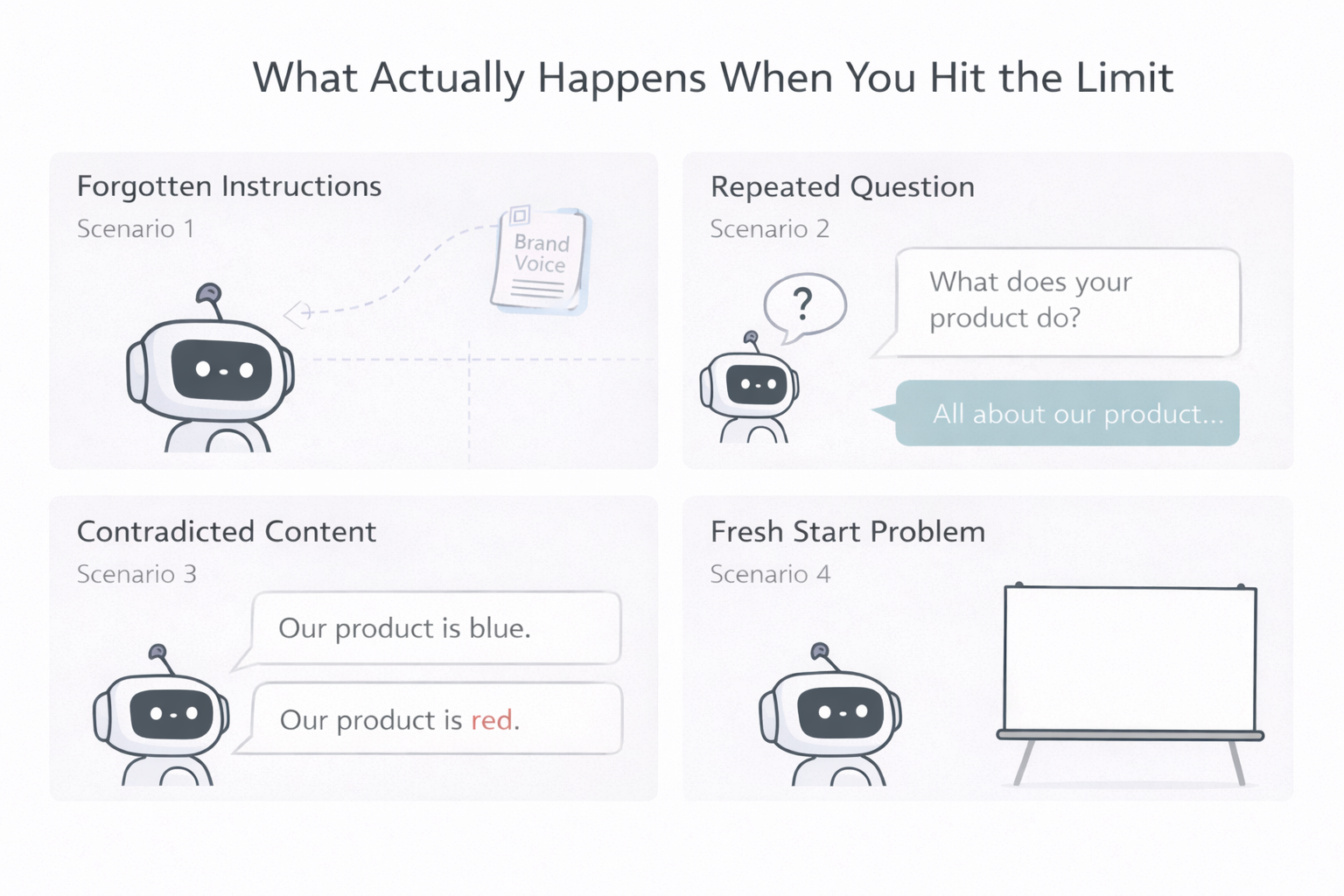
Prompt Engineering, Prompt Engineering Fundamentals
Context Windows Explained: How Much Information Can AI Actually Remember

Prompt Engineering, Prompt Engineering Fundamentals
Temperature and Creativity: Understanding AI Parameters (Simple Explanation)
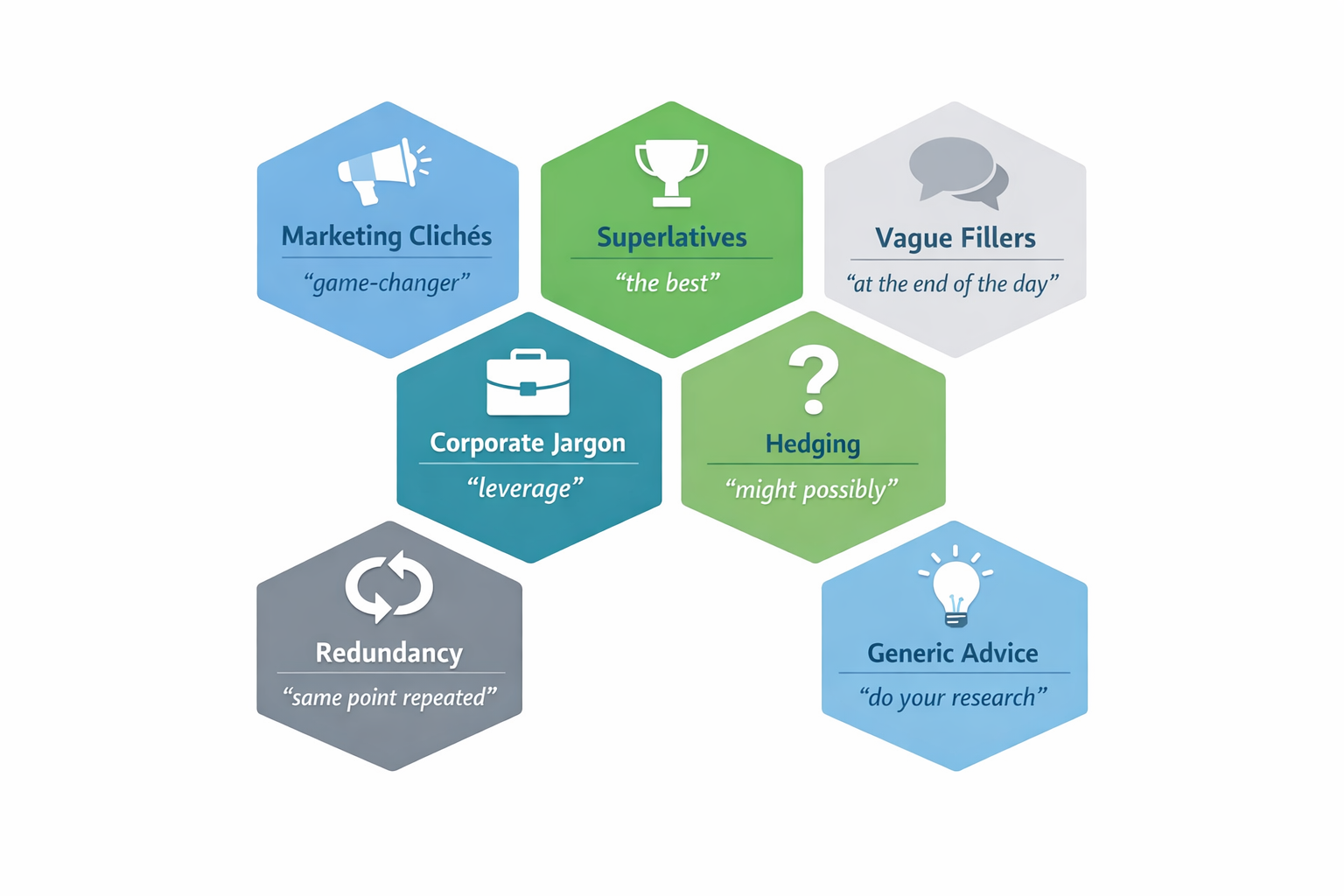
Prompt Engineering, Prompt Engineering Fundamentals
Negative Prompting: What NOT to Include (And Why It Matters)
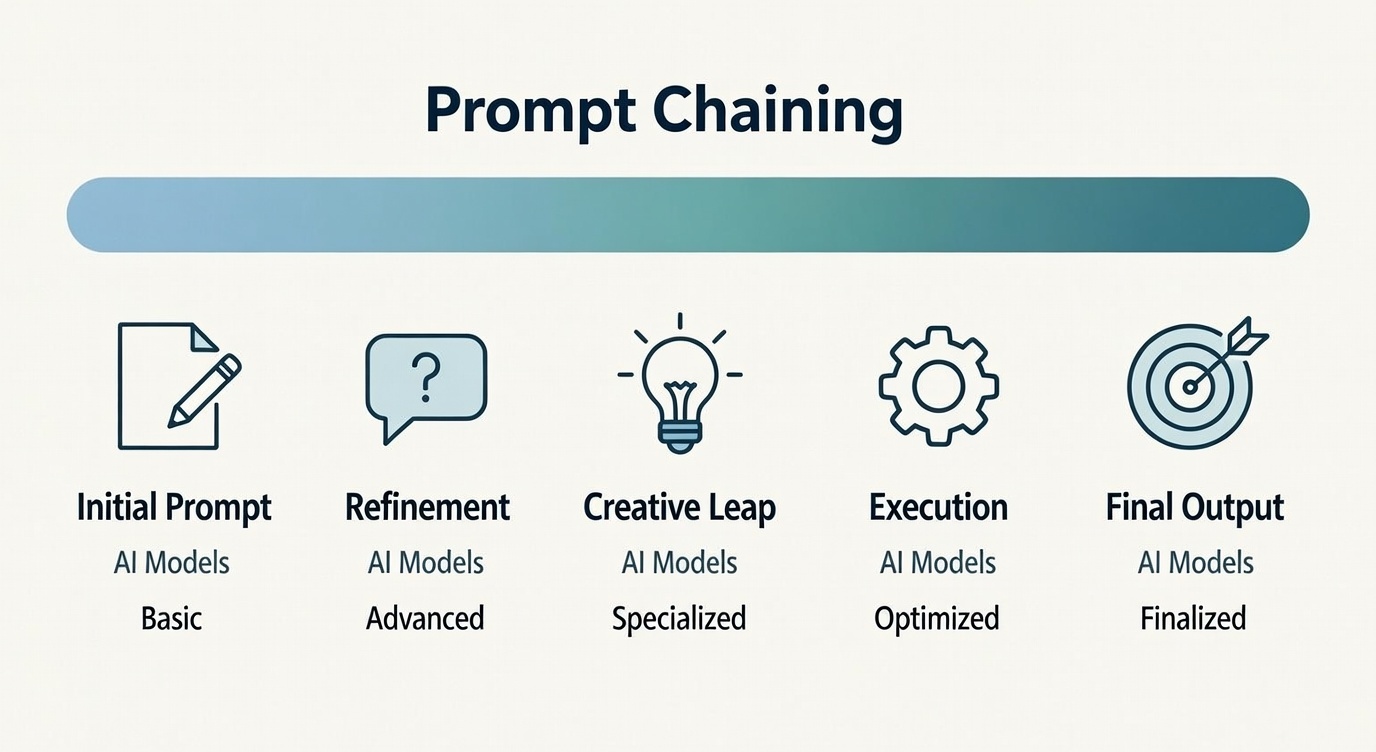
Prompt Engineering, Prompt Engineering Fundamentals
Prompt Chaining: Break Complex AI Tasks Into Simple Steps
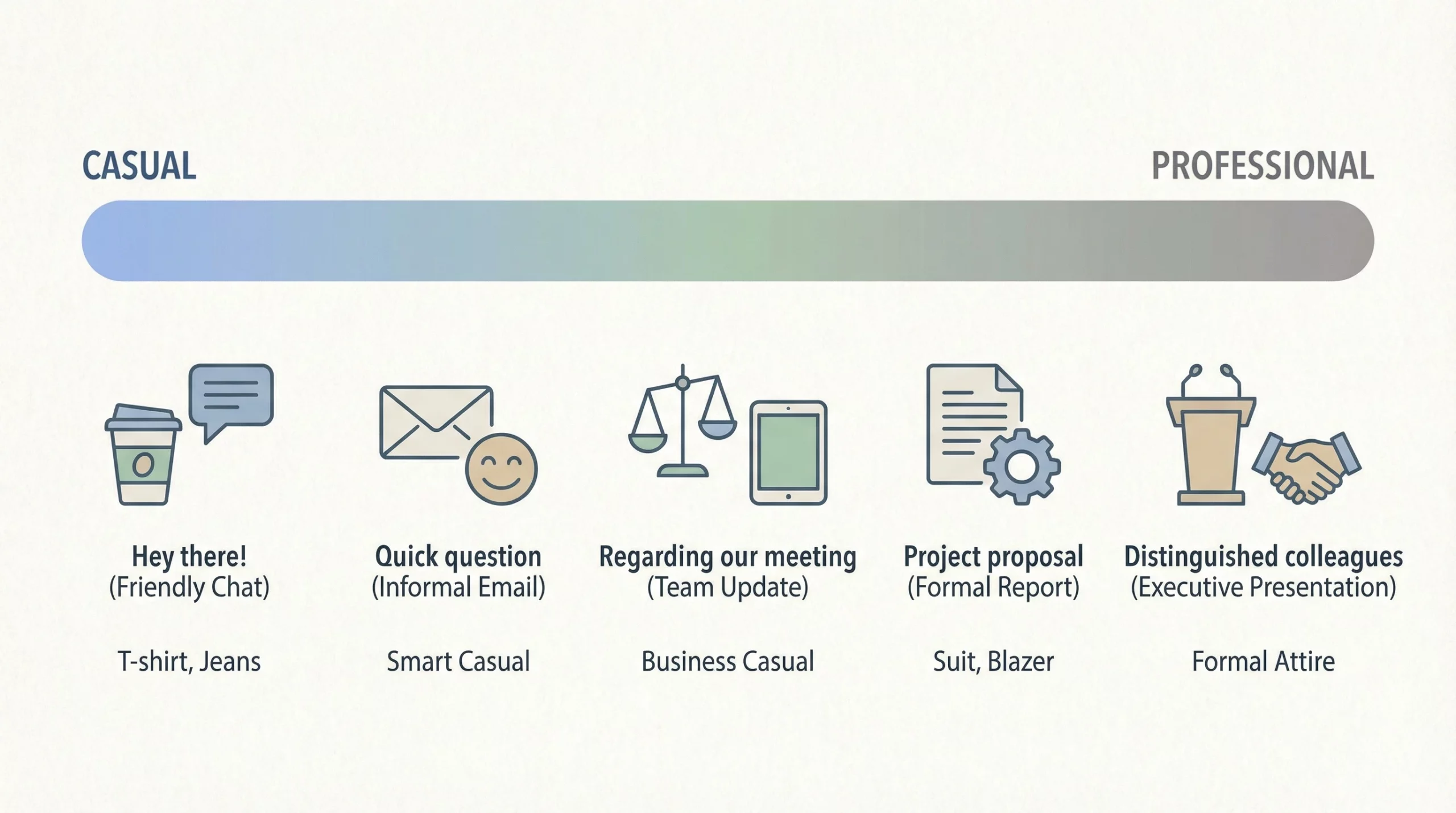
Prompt Engineering, Prompt Engineering Fundamentals

I was wondering whether a blog can rank without backlinks. I must admit, this article do provides insightful information and analysis on an important aspect of search engine optimization (SEO).
You delve into the question of whether a blog can achieve high rankings in search engine results without the use of backlinks.
I appreciate the Your comprehensive exploration of the topic, presenting both sides of the argument and offering their own perspective. The article discusses the significance of backlinks in SEO and how they can contribute to improving a blog’s visibility and authority.
The inclusion of real-world examples and case studies adds credibility to the content.
This is a valuable resource for bloggers and website owners seeking to understand the role of backlinks in SEO and explore alternative strategies for improving their search engine rankings. The article offers valuable insights, practical tips, and a balanced perspective on the topic. I highly recommend this article to anyone looking to optimize their blog’s visibility and organic traffic.
Hello and thank you for your comment.
I am glad you find it helpful. This topic is actually vast and it can’t be explored in one single article. Although tried my best;
I will approach it from various angles and perspectives.
Again thanks a lot and if you have further questions let me know
cheers
Mike